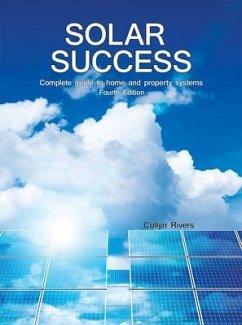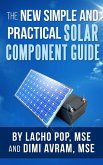Essentially, Solar Success is about using solar energy to reduce the fossil generated electricity that we use: to reduce one's carbon footprint. Throughout, it stresses the need to reduce what one uses unnecessarily before one thinks about generating more. This can be done by three associated and economically viable approaches:
. reduce energy usage by doing things differently
. reduce energy usage by using more energy-efficient appliances
. change the supply of energy to non-fossil fuel through appropriate technology.
The solar energy required is there; 7000 times more energy than the world currently uses is available. It makes every sense to use it and countries worldwide increasingly do.
Solar is also affordable. In California, Italy and Japan, solar power now challenges power generated through natural gas and nuclear energy. In Germany, home owners' solar generated surplus fed back into the grid network and all energy generated is paid at close to five times grid electricity's buying cost.
Australia's solar take up is high in rural areas that lack grid-connection. Sales of systems that draw from and feed back to the electricity grid (i.e. grid-connect) proved even more successful than expected as installation rebates and feed-in tariffs were initially very generous.In mid 2014 the Australian Federal government virtually ceased paying rebates on the curious basis that the scheme was attracting many more takers than had been expected. There is now however a growing move to go off-grid as electricity prices continue to rise (and feedback payment drop).
Knowing what is practicable and what is less practicable with solar enables readers to evaluate what is offered. And to have an often necessary and educated say in the decisions. For those who wish to design and implement systems themselves, Solar Success shows how to do it, and how to avoid the traps.
However you finance the system, and no matter where or how you live, follow the guidelines in Solar Success and you will have an economic system that will supply clean and reliable power for years to come.
. reduce energy usage by doing things differently
. reduce energy usage by using more energy-efficient appliances
. change the supply of energy to non-fossil fuel through appropriate technology.
The solar energy required is there; 7000 times more energy than the world currently uses is available. It makes every sense to use it and countries worldwide increasingly do.
Solar is also affordable. In California, Italy and Japan, solar power now challenges power generated through natural gas and nuclear energy. In Germany, home owners' solar generated surplus fed back into the grid network and all energy generated is paid at close to five times grid electricity's buying cost.
Australia's solar take up is high in rural areas that lack grid-connection. Sales of systems that draw from and feed back to the electricity grid (i.e. grid-connect) proved even more successful than expected as installation rebates and feed-in tariffs were initially very generous.In mid 2014 the Australian Federal government virtually ceased paying rebates on the curious basis that the scheme was attracting many more takers than had been expected. There is now however a growing move to go off-grid as electricity prices continue to rise (and feedback payment drop).
Knowing what is practicable and what is less practicable with solar enables readers to evaluate what is offered. And to have an often necessary and educated say in the decisions. For those who wish to design and implement systems themselves, Solar Success shows how to do it, and how to avoid the traps.
However you finance the system, and no matter where or how you live, follow the guidelines in Solar Success and you will have an economic system that will supply clean and reliable power for years to come.
Dieser Download kann aus rechtlichen Gründen nur mit Rechnungsadresse in A, D ausgeliefert werden.









